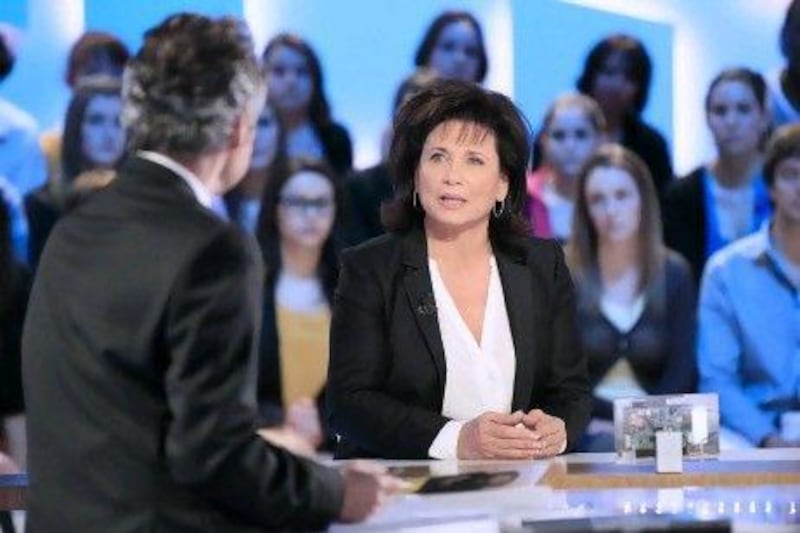MARSEILLE, FRANCE // As the French presidential elections approach their final stages, Anne Sinclair might reflect that she should have been contemplating life as France's first lady.
The public downfall of her husband, Dominique Strauss-Kahn, considered until just less than a year ago the man most likely to succeed Nicolas Sarkozy as president, has put the Elysée palace far beyond the couple's reach.
But as Ms Sinclair's own return to public life gathers pace, she has drawn on her long experience as a television journalist to secure a high-profile role in the elections, eight-hour stints commenting on the results in election-night specials on the French news channel BFM TV.
The programmes will be broadcast on April 22, the date of the first round, and May 6, when the two front-runners, expected to be Mr Sarkozy and François Hollande, who replaced Mr Strauss-Kahn as the socialist challenger, face a deciding vote.
If forecasts are correct, it will fall to Ms Sinclair and her co-hosts, the BFM presenters Olivier Mazerolle and Ruth Elkrief, to announce and assess triumph for Mr Hollande.
Until DSK, as her husband is commonly known in France, was arrested on charges of sexually assaulting and attempting to rape a chambermaid in his New York hotel suite, he was widely regarded as easily the socialists' best candidate, a man with the gravitas to defeat Mr Sarkozy comfortably at the polls and serve France as a respected head of state.
Although the sex charges were later dropped, amid doubts about the credibility of his accuser, Mr Strauss-Kahn was obliged to stand down as the managing director of the International Monetary Fund. The socialist primaries proceeded without him, Mr Hollande cruising to victory.
Throughout his encounter with the United States justice system, DSK was able to count on the loyal support of his New York-born wife, who has dual French and American citizenship.
Ms Sinclair reacted to his arrest by issuing an unequivocal statement expressing belief in his innocence: "I don't believe for a single second the accusations of sexual assault by my husband."
Then she flew to New York and used her substantial personal wealth to ensure stringent bail conditions could be met. Since his return to France, DSK has faced further embarrassment arising from his relations with women. First, Paris prosecutors investigated a 10-year-old allegation, which had resurfaced during his fight against criminal charges in New York, that he tried to rape a writer, Tristane Banon, then 22, when she interviewed him for a book on politics.
The outcome - insufficient evidence for an attempted rape charge, while the time lapse meant a lesser accusation of sexual assault could not be pursued - hardly reflected well on DSK. He was also implicated in an investigation into alleged organised prostitution in the French city of Lille. He faces charges in relation to that inquiry, though he says he is innocent as he has done in all cases accusing him of criminal wrongdoing.
As DSK has slid deeper and deeper into public disgrace, Ms Sinclair has been busily resurrecting her own career.
She was appointed head of a new French version of the US news website The Huffington Post, which was credited with 1.8 million unique visits last month after just two months of operation.
It was an election tie-up between the site and BFM TV, reportedly negotiated at Ms Sinclair's instigation, that led to election broadcasting job.
But Ms Sinclair had already appeared on peak-time French television, as a talk-show guest to promote her recently published book, 21 rue la Boétie, which tells the story of her grandfather, Paul Rosenberg, whose art collection is the source of her wealth.
And whatever her innermost thoughts about the sort of publicity her husband's activities have generated, she has continued to display a brave face.
Ms Sinclair, 62, who became a household name in France when she presented a popular current affairs programme 7/7 between 1984 and 1997, said her qualifications for discussing politics could not be questioned. "Election night, for a journalist, is the climax of months of newsmaking. I will be able to bring to the programmes my experience of political programmes in the US."
As DSK ponders the might-have-beens, there is already speculation that his wife will be back in the television studios in June, for the French parliamentary elections, and later in the year when Americans vote in their presidential elections.







